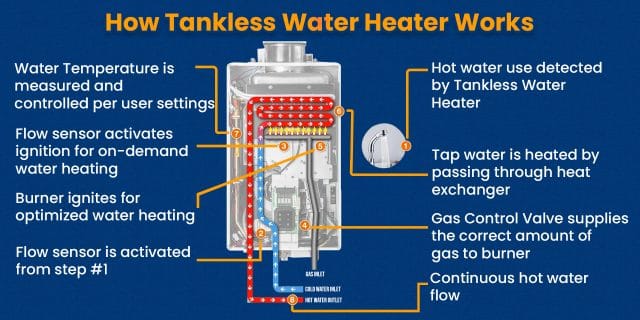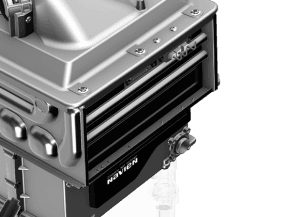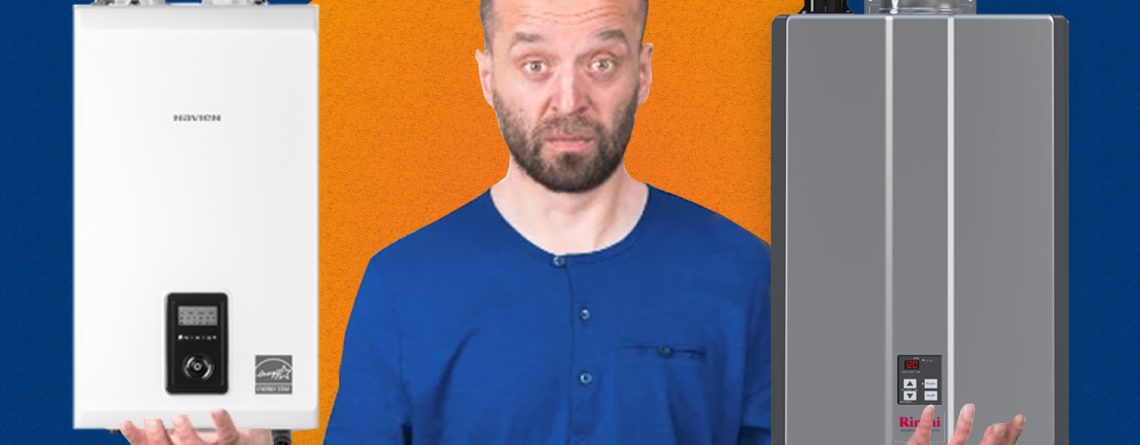Navien Vs. Rinnai: Which is Better?
Did you know upgrading to a tankless water heater could save you hundreds of dollars every year? Switching to a tankless water heater is a smart solution for homeowners aiming to save money and improve efficiency in their daily lives. When researching tankless water heaters, two names in particular stand out, based on their quality and reputation for dependability: Rinnai and Navien.
Both are top-notch brands with excellent reputations, but which one fits your needs best? We’re here to help you figure that out by comparing their features, costs, and performance side-by-side. Here’s what you’ll learn:
In this article:
Brand profile of Rinnai and Navien’s
Head-to-head comparison of key features
Condensing Vs. Non-Condensing
FAQ
Advantages of Tankless Water Heaters: Hot Water When You Need It
Tankless water heaters provide hot water on demand, meaning they heat water only when you need it. Unlike traditional tank models that store and reheat water continuously, these systems save energy by eliminating standby heat loss. If you want a continuous hot water supply that’s both efficient and compact, a tankless model could be the perfect solution.
You depend on hot water for many daily tasks, such as washing dishes, doing laundry, and enjoying a hot shower. Having a system that uses less energy and costs less to run makes good financial sense, especially with energy prices on the rise.
Whether you’re looking for gas tankless water heaters or a system for your entire home, both Rinnai and Navien have products designed to meet a variety of needs. The next step is understanding what sets these brands apart.
Brand Profiles: Rinnai and Navien
Rinnai
Rinnai is a Japanese company with a legacy of producing reliable, durable appliances. Known for their commitment to quality, Rinnai offers a wide range of whole-house tankless heaters that are designed to last upwards of 20 years with proper maintenance. Their systems emphasize longevity and performance, making them a favorite among homeowners who value reliability.
Navien
Navien is a South Korean brand that has made a name for itself with innovative, energy-efficient designs. Their whole-house tankless water heater systems, featuring advanced condensing technology and built-in recirculation pumps, make them a go-to choice for those prioritizing eco-friendliness and cutting-edge technology. While newer to the market than Rinnai, Navien is a strong competitor in providing comprehensive hot water solutions for larger homes.
Key Factors For Comparison

Energy Efficiency
Energy efficiency is a crucial consideration when selecting a tankless water heater, as it directly impacts both your utility bills and environmental footprint.
Navien: With Uniform Energy Factor (UEF) ratings reaching up to 0.96, Navien stands out due to its advanced condensing technology. This technology not only maximizes heat transfer but also minimizes energy loss, making it one of the most efficient options on the market. Navien's built-in recirculation pumps help reduce water waste by ensuring hot water is readily available at the tap, which is particularly beneficial for larger homes with multiple bathrooms.
Rinnai: Offers impressive UEF ratings of up to 0.93, making it highly efficient, though slightly less so than Navien. Rinnai's commitment to quality means that their systems are designed to maintain efficiency over time, even with regular use. Their models also feature advanced technology that optimizes energy consumption, ensuring that homeowners get the most out of their investment.
Verdict: Navien takes the lead in energy efficiency with higher UEF ratings and innovative features that promote sustainability.
Flow Rate
For larger households, a high flow rate is essential to ensure you can run multiple showers and appliances simultaneously without running out of hot water.
Navien: The NPE-240A model delivers an impressive flow rate of up to 11.2 gallons per minute (GPM), making it an excellent choice for homes with high hot water demands. This model is particularly well-suited for families who frequently use multiple hot water sources at once, such as during morning routines or when hosting guests.
Rinnai: The RU199iN model offers a comparable flow rate of 11 GPM. While slightly lower than Navien, it still provides ample hot water for most household needs. Rinnai's systems are designed to maintain consistent performance, ensuring that users experience minimal fluctuations in water temperature and pressure.
Verdict: Navien edges ahead with a slightly higher flow rate, making it the better option for larger households.
Installation Costs and Venting Options
Professional installation is necessary for tankless water heaters, and costs can vary based on the model, geographic location, and venting requirements. Prices listed are a general estimate and may be more or less than your actual costs.
Navien: Utilizes affordable PVC venting for its condensing models, which simplifies installation and reduces overall costs. The inclusion of built-in recirculation pumps further streamlines the setup process, making it easier for installers to integrate the system into existing plumbing. Total installation costs typically range from $1,900 to $3,400, depending on the complexity of the installation and any additional modifications needed.
Rinnai: Generally requires stainless steel venting, which is more durable but also more expensive. Rinnai systems may also necessitate gas line upgrades, leading to higher installation costs, typically between $2,000 and $4,000. While Rinnai's systems are known for their reliability, the initial investment can be higher due to these additional requirements.
Verdict: Navien is more cost-effective and easier to install
Condensing vs. Non-Condensing Models

When it comes to tankless water heaters, understanding the differences between condensing and non-condensing models is essential for making an informed choice. Both Rinnai and Navien offer options in each category, but they cater to different needs and preferences.
Condensing Models
Navien’s condensing models are at the forefront of efficiency and technology. These units utilize advanced condensing technology that captures and reuses exhaust heat, resulting in higher energy efficiency and lower operating costs. For instance, Navien’s dual stainless steel heat exchangers maximize heat transfer, allowing for impressive performance even in colder climates. This technology not only reduces energy consumption but also minimizes greenhouse gas emissions, making Navien a top choice for environmentally conscious consumers.
Non-Condensing Models
On the other hand, Rinnai provides reliable non-condensing options that are ideal for homeowners on a tighter budget. While non-condensing models typically have lower upfront costs, they may not be as energy-efficient as their condensing counterparts. However, Rinnai’s non-condensing units are known for their durability and consistent performance, making them a solid choice for those who prioritize reliability over advanced features. These models are particularly suitable for smaller households or situations where hot water demand is moderate.
Verdict: Navien leads in the condensing category with its innovative technology and efficiency, while Rinnai excels in providing dependable non-condensing options that cater to budget-conscious consumers.
Lifespan and Warranty
The lifespan and warranty of a tankless water heater are critical factors that can influence your long-term satisfaction and investment.
Navien
Navien stands out with a generous 15-year warranty on its heat exchangers, reflecting the brand's confidence in the durability and efficiency of its products. This extended warranty not only provides peace of mind but also indicates that Navien designs its units for long-term performance. With proper maintenance, these heaters are built to last, ensuring that homeowners can enjoy reliable hot water for years to come.
Rinnai
Rinnai offers a 12-year warranty, which is competitive in the industry. However, what sets Rinnai apart is the reputation of its units for longevity; many Rinnai models are known to last over 20 years with appropriate care. This durability means that while the warranty period may be shorter, the actual lifespan of Rinnai units can provide excellent value over time, making them a trusted choice for many homeowners.
Verdict: Navien’s longer warranty is a significant advantage, providing reassurance for buyers. However, Rinnai’s proven durability and longevity help balance the scales, making both brands strong contenders in the tankless water heater market.
FAQs
1. Which water heater is better, Navien or Rinnai? Navien is better for energy efficiency and advanced features, while Rinnai excels in durability and reliability.
2. What is the most reliable brand of tankless water heater? Rinnai has a longer track record for reliability, often lasting over 20 years.
3. What is the problem with the Rinnai tankless water heater? The main drawback is higher installation costs due to venting and gas line requirements.
4. What is the warranty on Navien vs. Rinnai? Navien offers a 15-year warranty on heat exchangers, while Rinnai provides a 12-year warranty.
Take the Next Step Today!
Both Rinnai and Navien are top contenders in the tankless water heater market, but the right choice depends on your priorities. If energy efficiency and advanced features like built-in recirculation pumps matter most, Navien is the clear winner. If durability and a proven track record are your top concerns, Rinnai is an excellent choice.
At Choice Plumbing Orlando, we specialize in helping homeowners choose and install the best tankless water heater for their needs. Ready to make the switch to a tankless water heater? Give us a call today at 407-422-7443 for a free in-home tankless water heater consultation and estimate! Let’s get your home equipped with the reliable hot water system it deserves.

